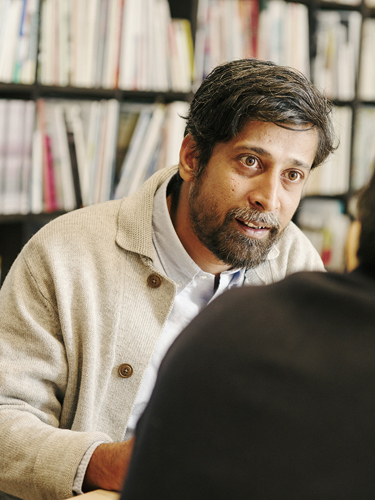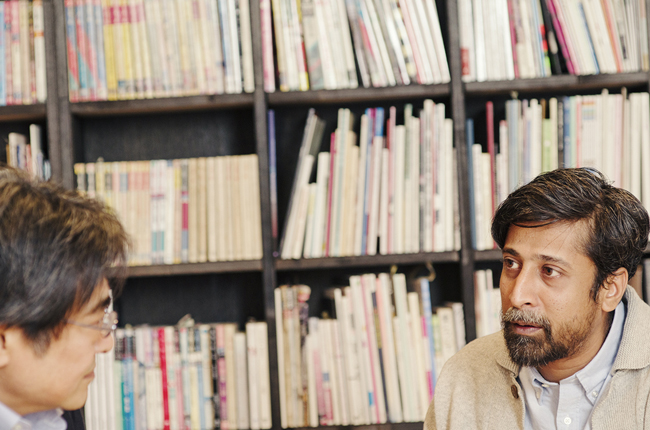Building a theater in the jungle of Attappadi
Uchino: When did your ambitious project of establishing a theatre in the jungle come up?
Sankar: For this elephant research we went to the jungle. That was the first time I went to Attappadi. Also, my training in intercultural theater was always about working with collaborators from different cultures, German actors or Japanese actors. Suddenly, when I went into these spaces like Attappadi, I realized that in my backyard there is this completely different domain of indigenous culture and I started to question my sensibilities of this 'intercultural' – does it mean anything here? Can it mean anything in this realm, not just in an outward Japan or Singapore but can it go deeper?
Uchino: Probably the reader wouldn't understand your explanation, your definition, of the indigenous peoples.
Sankar: Okay. The word itself is very tricky. But, these are the categories that are used in our daily life vocabulary back in India. Tribe is the word that is used, a colonial word to collectively address particular communities who live in relative isolation, exclusion, economic backwardness and who don't fully confirm to the western models of governance and ideals of civilized living like waged labour and settled agriculture. This I say in the context of Attappadi. It is different in different regions.
Uchino: You don't use the word 'outcast?'
Sankar: Adivasi is the word which is used, which means original inhabitants. But these communities live in the fringes of society. Also, we have a caste system in India, the Hindu socio-religious structure, which has historically excluded these communities, a hierarchy which puts the priest on top.
Uchino: The Brahmins.
Sankar: The Brahmins, "the most pure ones". And from there, the further you go, the one who does work with earth and mud and leather and skin, they are the people who are deemed to be the most "impure." Along this scale run the levels of privilege on one side and disentitlement on the other. Adivasis exist even outside this caste framework. Also, the country has a history of practice of untouchability. It is criminalized in the constitution without adequately defining it. If you look at the way many Indians drink water, they drink water without the cup touching the lip. I would even say that this gesture, it's avoiding a physical contact. We don't shake hands when we greet. We put our own palms together to greet. So, it's there in all aspects of our life. It's very invisible and impermeable.
Uchino: This may bring us back to a wider issue of colonialism in India. Kerala was colonized by the British but not by the Mughal empire, right? I found it interesting that Kerala was independent until the British came.
Sankar: The Portuguese came, the Dutch were there but not colonized as a Mughal Empire.

Uchino: And, did it make it any different from the other states where the Mughal Empire presided over – the Muslims presided over for a long time? I was just wondering is there any historical difference. Or were the outcomes of the modernization any different from the other states because of the Muslim influence?
Sankar: The first mosque in India was built in Thrissur in the 7th century. The Mughals came to India much later, in 15th century. Kerala had deep Arab and Islamic connection prior to the Mughals. Also, there is this kind of secessionist sentiment in Kerala, which could be due to the historical difference from the other parts of India. Even politically. We have a far right central government now, but we still have a communist government in Kerala.
Uchino: The communist came back into power again?
Sankar: Yeah. They came back to power and they are in power now.
Uchino: I probably have to explain the political situation in Kerala. I know that Kerala is the first...
Sankar: Democratically elected communist government in India and second in the world after San Marino.
Uchino: When I went to Kerala 2 years ago, they were out of power but they are trying to come back to the power.
Sankar: Yes. They are back in power now and it's also a communist government, which came into power without a revolution. And theater played a very central role in that.
Uchino: How?
Sankar: Back in the 50s, there was a play called You Made me a Communist Ningalenne Communistakki. Communist parties were banned in India during the British rule and during the early years of independent India. Which meant that, to be a communist was a crime like you would be taken into the jail. It was during such times that this theater piece went into the nooks and corners of Kerala and brought out this sort of proletarian awareness in people. It is about how these feudal landlords slowly embraced communism and became progressive communists. It did have a strong impact in the lives of people.
Uchino: Okay, so we will probably come back a little bit more about your theater in the jungle but before that I had another question about Thrissur. You are based in Thrissur, right?
Sankar: I used to, before moving to Attappadi.
Uchino: Because Thrissur seems to be a very interesting city of migrant workers. Many people go to work in Arab countries and most of the male population seems to work over there and there are lots of huge houses which looked very empty. Does that affect a lot on the culture there?
Sankar: Kerala depends a lot on this money from the Arab countries, unlike other parts of India. There are people working in Saudi Arabia, in Kuwait, in Bahrain, in Oman all these countries. They send money back and a large part of the Kerala's economy has been sustained by this money.
Uchino: But not culturally influential?
Sankar: Islam is strong. We have had notable playwrights, like K. T. Muhammed and P. M. Taj who brought out a very progressive outlook into the cultural sphere – they were religious reformers as well. Through theatre they reformed the practice and perception of Islam in Kerala to be a more open, secular sort of...
Uchino: So it's not fundamentalist.
Sankar: No.
More open. Progressive. Very progressive, I would say.
Uchino: Now we finally can come back to this project in the jungle. When did it start?
Sankar: The initial impulse was again when we went to the jungle to do the research and my question of whether my intercultural sensibilities would make any sense here.
Uchino: But even before that, you were at least unconsciously aware that there were those people in the jungle?
Sankar: Yes. But it never concerned me. It was never my concern. It was always somebody else's problem for me. Until when I started to move into this space and live there, then it starts to become my problem also. I think that was the kind of shift which challenged me, and I embraced the challenge.
Uchino: You went for the research but you decided to live there. When was that?
Sankar: Starting from 2010.
Uchino: : What was the strongest motivation for that?
Sankar: If I want to address then I had to integrate. I cannot be an outsider and approach any of those issues. So, the only way for me was to like...find proximity.
Uchino: But you were already meeting with these people before, right? You were getting to know them before that. Was it very difficult to speak to them?
Sankar: It was. At that time I was still an outsider who kept visiting the region.
Uchino: Do they speak Malayalam?
Sankar: They speak Malayalam but within their community, each has their own language, which doesn't have a written script. There are three indigenous communities in Attappadi. And, they are all classified as scheduled tribes under the constitution.
There are affirmative actions, and several policies, which areimportant but you see the policies are drawn up from Delhi and implemented on people living 3000 to 4000 kilometers away from the center, without much sensitivity towards what exactly they need. This sort of affirmative actions also create a sense of inclusive exclusion. They have tribal schools. And, if you learn in a tribal school, what I see is like students who come out of it cannot integrate to the...
Uchino: To the mainstream school system.
Sankar: So, these steps also create newer ways of segregation.
Uchino: And, how is your project intervening in this sort of very desperate or difficult situation?
Sankar: I went there with my desire to work with them, also had this us-them dichotomies. And then, I started to live there, went into the peoples houses, talked to them, and made a few theatre pieces. And slowly I also realized and asked myself this question whether are they interested to work with me?
Uchino: Who are you, right?
Sankar: These challenges, when one addresses little by little, we start to find ways to come together. Now we live next to each other, face the same circumstances and we share drinking water. I not only bring in theater there, I also intervene in certain actions where I see settler farmers – see, that word also is there, 'settlers', which means there is occupation. So, the settler farmers, even I am an occupier in that sense, in the indigenous people's land there. So, they exploit people. They have money. They have power. They have electricity. So, they are able to pump water up. And, these communities are not given access to drinking water. What culture when there's no drinking water? Then, I go into actions like making projects for drinking water, which shifts the status quo and starts to create a lot of trust and understanding and togetherness. Then, we find a common ground from where we can speak together.
Uchino: But you also sort of attract some kind of antagonism from the other side, from the farmers.
Sankar: Yes.

Uchino: And how do you deal with that?
Sankar: We have to talk and bridge the gaps. In some cases, there have also been certain police cases that we have gone into, some of which I had initiated. People don't write so you have to write complaints, read it out to them, and then get them – it's not in their language. You get them to sign mass petitions, take it to the police station.
Uchino: You're working with NPOs or other activists there, or you're the only one?
Sankar: Me and some of my colleagues who are also theater people and actors.
Uchino: That's very tough, isn't it? I understand you are currently building a theater there. How is it coming?
Sankar: We started with making a road because there was no access to the site. The construction is not complete, but it is functional in its own way. The theatre space is open, which means anyone comes in anytime, human or goats. It is not always convenient but the space helps me to conceive and imagine theatre in a different way. There are challenges like we recently had a landslide. We had to evacuate, so it is a challenge. It's worth doing it.
- Next Page
- Experiences of directing out of India






